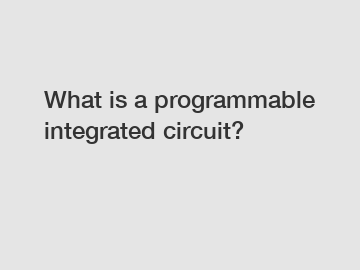What is a programmable integrated circuit?
What is a Programmable Integrated Circuit?
In today's technologically advanced world, programmable integrated circuits (ICs) play a vital role in powering numerous electronic devices we use every day. From smartphones and computers to smart home devices and even cars, programmable ICs have become an integral part of our daily lives. But what exactly is a programmable integrated circuit, and how does it work? This article will provide a comprehensive overview of programmable ICs, explaining their functionality, applications, and benefits.
A programmable integrated circuit, also known as a programmable chip or a field-programmable device, is an electronic component that can be customized to perform specific functions or tasks as per the user's requirements. Unlike fixed-function ICs, which are designed to perform a specific function permanently, programmable ICs offer flexibility and adaptability.

Functionalities of Programmable ICs.
Programmable ICs consist of an array of tiny electronic components, such as transistors, resistors, capacitors, and diodes, which are interconnected to create digital circuits. These digital circuits can be programmed or reprogrammed to perform different functions by altering the configuration of the circuitry. This configuration is typically done through specialized software tools that generate binary files containing instructions to configure the programmable IC.
Different Types of Programmable ICs.
There are various types of programmable integrated circuits available in the market today, catering to different application needs. The most common types include:
1. Programmable Logic Devices (PLDs): PLDs are widely used to implement digital circuits, such as combinational logic circuits and sequential logic circuits. They are highly versatile and offer customization options to suit specific design requirements.
2. Field-Programmable Gate Arrays (FPGAs): FPGAs are highly configurable ICs that provide vast resources for implementing complex digital circuits. They can be programmed to perform parallel processing tasks, making them suitable for applications like image processing, data analysis, and artificial intelligence.
Applications of Programmable ICs.
Programmable integrated circuits find application in numerous industries and sectors due to their versatility. Some common applications include:
1. Consumer Electronics: Programmable ICs are extensively used in smartphones, tablets, gaming consoles, and other consumer electronic devices to provide enhanced functionality and flexibility.
2. Automotive Industry: Programmable ICs play a crucial role in modern vehicles, controlling various systems such as engine management, safety systems, infotainment, and smart sensors.
3. Industrial Automation: In the industrial sector, programmable ICs are used for automation purposes, enabling precise control and monitoring of manufacturing processes, robotics, and other industrial machinery.
Benefits of Programmable ICs.
The use of programmable integrated circuits offers several advantages, including:
1. Flexibility: Programmable ICs can be easily reconfigured, allowing for quick adaptation to changing requirements or design iterations.
2. Cost-Effectiveness: The ability to reprogram an IC eliminates the need for separate hardware for each specific function, reducing costs.
3. Time-to-Market: With programmable ICs, designers can accelerate the development process by directly programming a device rather than waiting for specific components.
Conclusion.
Programmable integrated circuits have revolutionized the electronics industry by providing flexibility, customization options, and enhanced functionality to electronic devices. Their ability to be programmed according to specific requirements makes them an ideal choice for a wide range of applications in various industries. As technology continues to evolve, programmable ICs are likely to play a crucial role in powering the future. For more information or assistance with programmable ICs, feel free to contact us.
Contact Us: [Your contact information or website here].
For more information, please visit XCF04SVO20C Electronic Components, LTC1858IG#TRPBF, MPC8247VRTMFA.

Comments
0